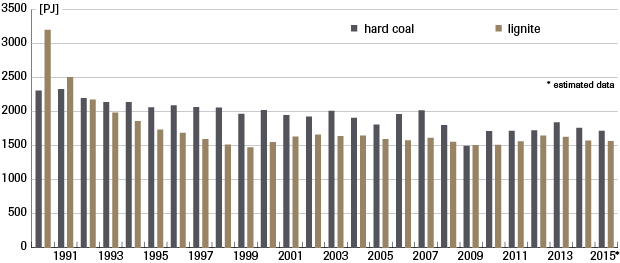Merkel stands up for the coal energy sector in Germany
On 14 March, Angela Merkel criticised the proposal to end coal combustion at German power plants in the immediate future. In her speech at a conference of the German Association of Local Utilities (VKU), the German chancellor declared that her intention was to avoid destabilising the market environment of companies from the Lusatia and North Rhine-Westphalia regions, where brown coal is produced.
Commentary
- Angela Merkel’s speech needs to be viewed in the context of the current election campaign. She addressed her speech both to potential voters of the SPD and the conservative electorate who are concerned about the stability of the German energy market. The Industrial Mining, Chemistry and Energy Union (IG BCE) represents around 650,000 workers and has appealed for the continuation of coal mining. In 2015, IG BCE held a demonstration of brown coal miners in Berlin to protect their workplaces, which was backed by trade union activists representing other industries. In effect, the government revised its plans of closing and taxing brown coal power plants.
- Immediately before the Paris climate conference in November 2015, the German minister for the environment, Barbara Hendricks (SPD), said that coal power plants might be phased out by 2035. Following this proposal, several in-depth analyses on the perspectives and tempo of the discontinuation of coal use in Germany have been developed over the past few years. The Greens are the only German political party to demand a coal phase-out (by 2035) in their political manifesto. This is also the key demand of German environment protection organisations. According to public opinion polls, around 70% of the German public support the policy of withdrawing from the use of coal. Due to the resistance from the trade unions and the poor financial situation of German energy companies, the government has not made a decision concerning the future use of coal in Germany in this term. The German brown coal mining sector employs over 20,000 people (including power plant workers), 10,000 of whom work in the coal basins in Lusatia and Saxony in eastern Germany owned by the Czech holding EPH. The hard coal mining sector employs around 10,000 people, but the two remaining German mines are to be closed by 2018.
- In 2015, Germany was the world’s largest brown coal consumer (173.7 million tonnes) and the EU’s second largest hard coal consumer (72 million tonnes). At the same time, Germany is among those states which are lobbying strongest of all to implement the ambitious greenhouse gas reduction goals. Despite this stance, Germany has not reduced emissions since 2009, which have remained on a stable high level for eight years. It would be possible to re-join the emission reduction path by eliminating coal from the power sector and reducing oil consumption in the transport sector. The CDU has so far opposed reforms to this effect, and Merkel’s most recent statement gives grounds to believe that the Christian Democrats will not change their stance. At the same time, nothing indicates that Berlin could change its stance supporting the ambitious goals of the global and European climate policies.
Coal consumption in Germany in 1990-2015 in PJ






